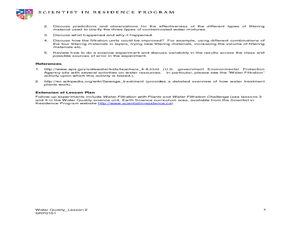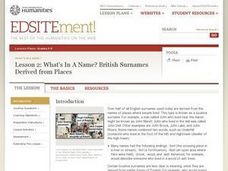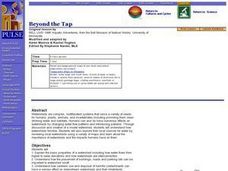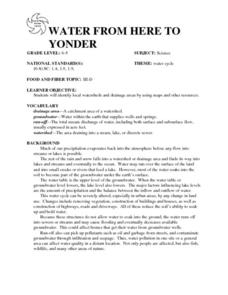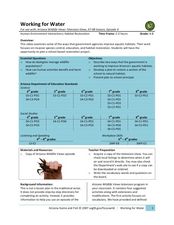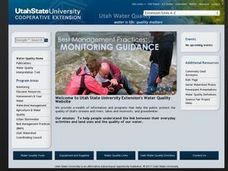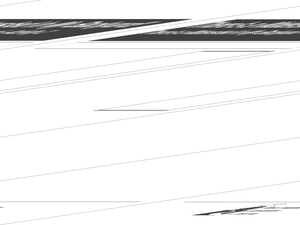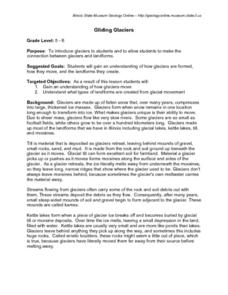Curated OER
Water Quality: Water Filtration
Students build a water filtration system. In this water quality lesson, students work in groups to construct water filtration units that can purify contaminated water. This lesson is part of a larger unit on water quality.
Curated OER
Repopulating Michigan's Waterways
Eleventh graders identify the parts of an ecosystem and how communities change over time. In this ecology lesson students formulate a habitat restoration plan.
Curated OER
WHO Wants Clean Water! Do You? Solving Conflicts Over International Water Rights Issues
Students examine the water rights on an international scale. In this social studies lesson, students research on a specific water rights issue. They write a paper about their findings and create a PowerPoint presentation which they share...
Curated OER
Beat the Heat: Meander Through These Books
A hazy, daisy, lazy summer reading list for math (and interdisciplinary) learning.
Curated OER
British Surnames Derived from Places
Learners use a guiding question in order to provide a context for future research. They develop an understanding of British surnames derived from locations and learn some of the more common names still prevalent today.
Curated OER
Pond 1: Pond Life
Students work together to investigate familiar and unfamiliar ecosystems. Using the internet, they discover how different organisms use their environment to satisfy their needs. They also examine the relationshiops between organisms...
Curated OER
Beyond the Tap
Students explain the basic properties of a watershed including how water flows from higher to lower elevations and how watersheds are interconnected. They comprehend how the placement of buildings, roads, and parking lots can be...
Curated OER
Hydrologic Cycle
In this science worksheet, students examine the hydrological cycle through the coloring of the picture that graphically organizes the concept.
Curated OER
Examine an Ecosystem
Students examine an ecosystem and record what they see. In this ecosystem lesson students use a worksheet to help them identify the organisms in their ecosystem.
Curated OER
WATER FROM HERE TO YONDER
Students identify local watersheds and drainage areas by using maps and other resources. They are given copies of the water cycle. Students discuss the movement of water in the environment. They observe, record and transfer information...
Curated OER
Working for Water
Students examine the ways that government works to help improve aquatic habitats. In this water habitats lesson students view a video and plan a school restoration project.
Curated OER
Exploration Watershed
Students discuss what a watershed is, and locate watersheds on a map. In this watershed lesson, students use the information they have been introduced to and create a color coded watershed map of their own.
Curated OER
Surface Water Model
Students examine, through demonstration and experimentation, how water moves through watershed, identify pollutants that can enter water system from different land use activities, and discuss ways people can help prevent water pollution.
Curated OER
There's a Watershed in my Backyard!
Young scholars explain what the term watershed is by creating a model. In this science, geography lesson, students demonstrate how the water moves in a watershed. Additionally, young scholars learn about point source and nonpoint source...
Curated OER
Geography
In this geography worksheet, students write the vocabulary word for the geography definition given. Students complete 22 problems with words from a word bank.
Curated OER
THE TRICKLE DOWN EFFECT
Students participate in an exercise which demonstrates how sediments are deposited.
Curated OER
Water Features - Lesson 2 - U.S. Political Map Grade 4-5
Students locate water features on maps. In this geography lesson, students complete worksheets that require them to identify water features on a U. S. political map.
Curated OER
TRANSPIRATION IN PLANTS
Young scholars define the hydrologic cycle, define transpiration, name the three parts of the hydrologic cycle, and record the amount of moisture given off by several green plants.
Curated OER
Gliding Glaciers
Students are introduced to the concept of glaciers. They discover how glaciers move and what types of landforms are formed by glaciers.
Curated OER
Landforms of Illinois
Pupils discover the primary landforms of Illinois. They examine how those landforms were formed as well. In groups, they research one of the landforms from their vocabulary list. They create their landform in a shoebox and present it to...
Curated OER
Utah's Biomes
Fourth graders discover what a biome is and study biomes that are native to Utah in this series of lessons. They examine how Utah's biomes have changed over time due to the influence of the Mormon pioneers and other human populations.
Curated OER
Biomes
In this biomes worksheet, students review the characteristics of aquatic biomes and terrestrial biomes. This worksheet has 12 fill in the blank, 6 multiple choice, and 4 short answer questions.
Curated OER
Factors affecting infiltration and runoff
Students investigate some of the factors that determine the amount of runoff. They are reminded that infiltration and runoff tend to work oppositely. When conditions are bad for infiltration they usually lead to runoff.
Curated OER
All Hands on Deck: A Harbor Education Program
Students build a model of an estuary. In this wetland activity, students build a model estuary with a paint tray and modeling clay. They use the model to illustrate the impact of non-point pollution on the watershed.


